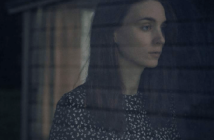Editor’s Notes: The following review is part of our coverage of the 2013 Toronto International Film Festival. For more information on the festival visit http://tiff.net and follow TIFF on Twitter at @TIFF_NET.
Manakamana (Stephanie Spray, Pacho Valez)
Spray and Valez’ Manakamana is a gentle, soft spoken illustration of human interiority. Composed of eleven Gondola rides to and from the Manakamana temple, the film’s long, still takes capture for eight minutes every blink, movement, and look of the characters on screen. In medium-close up for the most part, the characters are depicted either on their way to the temple or on their way back. Their faces, dialogues, and movements convey their inner selves. With the camera never highlighting the temple or even the mountains, the omitted information is incidental and therefore irrelevant. As a study of human gesture and faith, Manakamana explores the inner beings of humans. To contextualize this, a gondola ride with goats as passengers illustrate how humans adapt to noises and therefore have intentional thoughts—conscious, self-designed thoughts—while animals act on instinct. How the characters react to the Gondola’s mechanical noises therefore tells much about the way in which the person in question thinks. With only one set of passengers shown both going to and coming from the temple, there is little narrative development; Manakamana is consequently a rumination about people in certain instances.
[notification type=”star”]80/100 ~ GREAT. Spray and Valez’ Manakamana is a gentle, soft spoken illustration of human interiority.[/notification]
Young and Beautiful (Francois Ozon)
Though beginning much like the typical coming of age drama, with Isabelle (Marine Vacth) losing her virginity during a summer fling, Young and Beautiful becomes a unique exploration of sexuality, prostitution, and modern society’s sexually open-minded status. With a frank depiction of sexual discovery and self-identification, the film carries a unique and provocative tone. Though Isabelle, aka Lea, exchanges sexual favours for money, the sex scenes and girl in question are depicted with such tenderness and care that it’s difficult to believe that such a girl would commit such indecent acts. That said, it’s understandable how a young girl from this generation may unashamedly express herself through physical acts of pleasure. It’s moreover understandable how a girl might identify herself or affirm herself by doing something that requires such independence and maturity. Though a little ostentatious and rather controversial, Young and Beautiful leaves much open to debate.
[notification type=”star”]72/100 ~ GOOD. Though a little ostentatious and rather controversial, Young and Beautiful leaves much open to debate.[/notification]
Blue Is The Warmest Colour (Abdellatif Kechiche)
Winner of the Palme d’Or at Cannes Festival 2013, Blue Is The Warmest Colour is a much needed film about gender neutrality and other complex issues around sexual orientation and identification. Under the idea that love is not gendered, the film captures the coming of age, sexual discoveries, and sexual mistakes of Adele (Adèle Exarchopoulos), a high schooler once smitten by an older girl. As time is elided and the film covers the relationship from its passionate love affair to its bitter and hot tempered disconnection to its time of regret and remembrance, the film characterizes tragedy with eternity, suggesting that through the tragic end of their relationship, an existence of something eternal is born. With the colour blue not representing sadness but the solace needed for one to weather sadness, it symbolizes liberation and eternity. As Adele walks away in her blue dress, the gentle moments with her former lover continue to exist—whether it preceded existence or not, essence remains with the existence of their bond.
[notification type=”star”]90/100 ~ AMAZING. Blue Is The Warmest Colour is a much needed film about gender neutrality and other complex issues around sexual orientation and identification.[/notification]
Real (Kiyoshi Kurosawa)
Kurosawa’s Real is a slow burn. For a while, the film is lazy, bizarre, and simple-minded. Somehow, it begins as a genre film that is genre-less; it exercises itself at once as a Drama, Horror, Mystery, and Science Fiction film. With incredibly irrational elements such as the ‘philosophical zombies’ and the tenuous plot continuity device of moori and the dragon, it’s difficult to take Real as a serious meditation on either humanity or reality. As the film unwinds, however, and the twists are turned, Real becomes a fun adventure ride that somewhat redeems its earlier disasters. That said, as the plot thickens, it feels very much as if the narrative is simply being altered as things move along. Kurosawa doesn’t pay careful attention to how changes in the narrative reflect back on what has been shown. There are at least three different places where the film could have ended, and for this reason, the film comes across as rather insubstantial. Despite this, Real is replete with pleasant photography, emotional turbulence, and a thoughtful concept.
[notification type=”star”]70/100 ~ GOOD. here are at least three different places where the film could have ended, and for this reason, the film comes across as rather insubstantial. Despite this, Real is replete with pleasant photography, emotional turbulence, and a thoughtful concept.[/notification]




